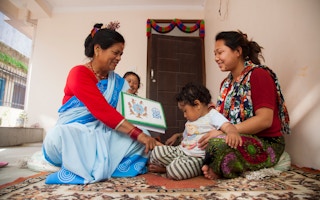For Nepali nurse Anshu, being picked for a job programme in Britain was long overdue recognition of her years of study and work - and a chance to boost her earnings.
“I finally feel my work has been valued,” said the 28-year-old, who asked to be identified only by her first name. She hopes her current monthly salary of 26,000 rupees (US$196) at a private hospital in Nepal will rise to more than 10-times that in Britain.
But as she and several dozen other nurses prepare to leave, the bilateral government pilot under which they were recruited has fuelled concerns about an acute shortage of nurses and other medical professionals in the South Asian country.
Though only 43 nurses were accepted for the pilot phase, an official at the country’s Department of Foreign Employment (DoFE) told Context a second phase was planned and that Britain eventually wanted to recruit 10,000 Nepali nurses.
While that would help Britain plug labour gaps in the National Health Service (NHS), it could exacerbate Nepal’s shortages, nursing officials said.
“The situation is already worrying,” said Hira Kumari Niraula, director of Nepal’s Nursing and Social Security Division (NSSD), a government body involved in the provision of public health services.
“Recently we started community health nursing and school nurse programmes to make nursing service available in needy communities. But the challenge is in many places we are not able to find nurses who are willing to work,” Niraula added.
Nepal currently has less than half of the 45,000 nurses that it needs working in the country’s hospital, rural clinics and other healthcare facilities, according to the NSSD.
It is among 55 countries included in a World Health Organization red list of nations facing a severe shortage of healthcare workers.
“
Recently we started community health nursing and school nurse programmes to make nursing service available in needy communities. But the challenge is in many places we are not able to find nurses who are willing to work.
Hira Kumari Niraula, director, Nepal Nursing and Social Security Division
“We are in a shortage situation but the government is encouraging nurses to migrate. Then who will stay in Nepal?” Niraula said.
The DoFE has defended the agreement signed with Britain, saying such accords ensure migrant nurses’ rights and help deter illegal migration and labour exploitation.
“There is news that Nepali nurses are being cheated, abused, and exploited abroad as they take backdoor entries,” said DoFE information officer Kabiraj Upreti. “This agreement can be a milestone.”
‘No future’
From Zimbabwe to the Philippines, concern is growing about the loss of qualified medical staff attracted by better salaries to take up health and care jobs in countries such as Britain, Australia, Canada and the United States.
In Nepal, more than one-third of the 115,900 nurses registered with the Nepal Nursing Council (NNC) have sought documents to practice overseas.
About half of Nepal’s migrant nurses went to the United States, followed by Australia and Dubai. Just over 500 have already migrated to Britain.
But the causes of the country’s medical staffing shortfall go beyond migration, said Roshan Pokharel, secretary of the Ministry of Health and Population.
“We are very much aware that a large number of health workers are migrating. But that’s not their problem. It’s our problem that we are not able to provide permanent, long-term, and stable jobs to our health workers,” Pokharel said.
“Government has allocated only around 4 per cent of the total budget to the health sector which is just not enough,” he added.
Limited financial resources for healthcare in the country of 30 million mean the lure of better-paid jobs abroad is stronger than ever for many nurses.
Tired of demanding working conditions and low pay, Grishma Basnet, 25, who works in the intensive care unit (ICU) at a private hospital in the capital, Kathmandu, has applied to work in the United States and is awaiting news on where she will go.
“I have to look after three patients in the ICU, whereas the global standard is one nurse should only look after one patient in the ICU. Isn’t this exploitation?,” said Basnet, who said she earned 15,000 rupees per month at present.
“Why should I stay in this country? There is no future here,” she said.
This story was published with permission from Thomson Reuters Foundation, the charitable arm of Thomson Reuters, that covers humanitarian news, climate change, resilience, women’s rights, trafficking and property rights. Visit https://www.context.news/.








